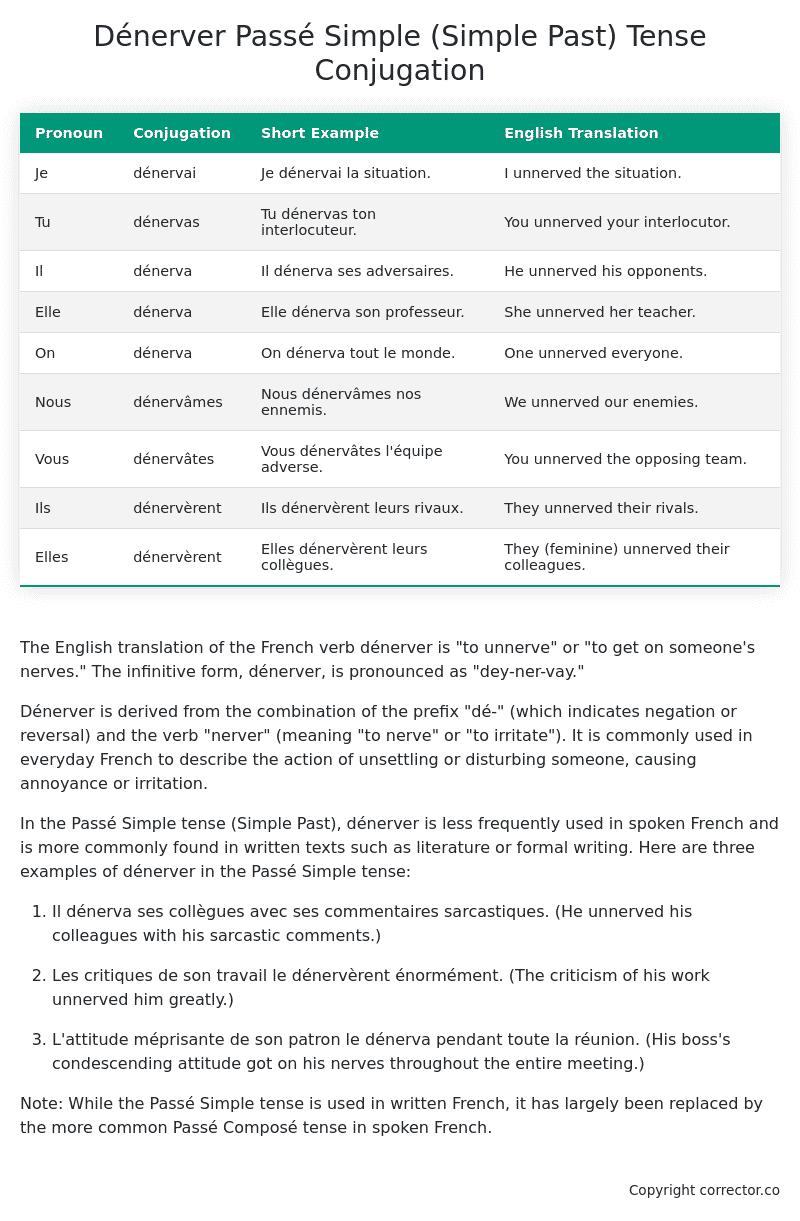Passé Simple (Simple Past) Tense Conjugation of the French Verb dénerver
Introduction to the verb dénerver
The English translation of the French verb dénerver is “to unnerve” or “to get on someone’s nerves.” The infinitive form, dénerver, is pronounced as “dey-ner-vay.”
Dénerver is derived from the combination of the prefix “dé-” (which indicates negation or reversal) and the verb “nerver” (meaning “to nerve” or “to irritate”). It is commonly used in everyday French to describe the action of unsettling or disturbing someone, causing annoyance or irritation.
In the Passé Simple tense (Simple Past), dénerver is less frequently used in spoken French and is more commonly found in written texts such as literature or formal writing. Here are three examples of dénerver in the Passé Simple tense:
-
Il dénerva ses collègues avec ses commentaires sarcastiques.
(He unnerved his colleagues with his sarcastic comments.) -
Les critiques de son travail le dénervèrent énormément.
(The criticism of his work unnerved him greatly.) -
L’attitude méprisante de son patron le dénerva pendant toute la réunion.
(His boss’s condescending attitude got on his nerves throughout the entire meeting.)
Note: While the Passé Simple tense is used in written French, it has largely been replaced by the more common Passé Composé tense in spoken French.
Table of the Passé Simple (Simple Past) Tense Conjugation of dénerver
| Pronoun | Conjugation | Short Example | English Translation |
|---|---|---|---|
| Je | dénervai | Je dénervai la situation. | I unnerved the situation. |
| Tu | dénervas | Tu dénervas ton interlocuteur. | You unnerved your interlocutor. |
| Il | dénerva | Il dénerva ses adversaires. | He unnerved his opponents. |
| Elle | dénerva | Elle dénerva son professeur. | She unnerved her teacher. |
| On | dénerva | On dénerva tout le monde. | One unnerved everyone. |
| Nous | dénervâmes | Nous dénervâmes nos ennemis. | We unnerved our enemies. |
| Vous | dénervâtes | Vous dénervâtes l’équipe adverse. | You unnerved the opposing team. |
| Ils | dénervèrent | Ils dénervèrent leurs rivaux. | They unnerved their rivals. |
| Elles | dénervèrent | Elles dénervèrent leurs collègues. | They (feminine) unnerved their colleagues. |
Other Conjugations for Dénerver.
Le Present (Present Tense) Conjugation of the French Verb dénerver
Imparfait (Imperfect) Tense Conjugation of the French Verb dénerver
Passé Simple (Simple Past) Tense Conjugation of the French Verb dénerver (You’re reading it right now!)
Passé Composé (Present Perfect) Tense Conjugation of the French Verb dénerver
Futur Simple (Simple Future) Tense Conjugation of the French Verb dénerver
Futur Proche (Near Future) Tense Conjugation of the French Verb dénerver
Plus-que-parfait (Pluperfect) Tense Conjugation of the French Verb dénerver
Passé Antérieur (Past Anterior) Tense Conjugation of the French Verb dénerver
Futur Antérieur (Future Anterior) Tense Conjugation of the French Verb dénerver
Subjonctif Présent (Subjunctive Present) Tense Conjugation of the French Verb dénerver
Subjonctif Passé (Subjunctive Past) Tense Conjugation of the French Verb dénerver
Subjonctif Imparfait (Subjunctive Imperfect) Tense Conjugation of the French Verb dénerver
Subjonctif Plus-que-parfait (Subjunctive Pluperfect) Tense Conjugation of the French Verb dénerver
Conditionnel Présent (Conditional Present) Tense Conjugation of the French Verb dénerver
Conditionnel Passé (Conditional Past) Tense Conjugation of the French Verb dénerver
Conditionnel Passé II (Conditional Past II) Tense Conjugation of the French Verb dénerver
L’impératif Présent (Imperative Present) Tense Conjugation of the French Verb dénerver
L’impératif Passé (Imperative Past) Tense Conjugation of the French Verb dénerver
L’infinitif Présent (Infinitive Present) Tense Conjugation of the French Verb dénerver
L’infinitif Passé (Infinitive Past) Tense Conjugation of the French Verb dénerver
Le Participe Présent (Present Participle) Tense Conjugation of the French Verb dénerver
Le Participe Passé (Past Participle) Tense Conjugation of the French Verb dénerver
Struggling with French verbs or the language in general? Why not use our free French Grammar Checker – no registration required!
Get a FREE Download Study Sheet of this Conjugation 🔥
Simply right click the image below, click “save image” and get your free reference for the dénerver Passé Simple tense conjugation!

Dénerver – About the French Passé Simple (Simple Past) Tense
Formation
Usage
Narration
Historical Context
Interactions with other tenses
Passé Composé
Imparfait
Conditional and Subjunctive
Summary
I hope you enjoyed this article on the verb dénerver. Still in a learning mood? Check out another TOTALLY random French verb conjugation!


